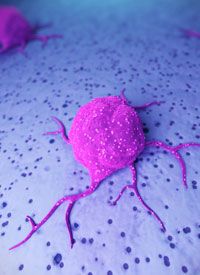Japanese Clinical Trial Aims to Standardize Anaplastic Thyroid Carcinoma Treatment
A Japanese research team attempted to standardize therapy for anaplastic thyroid carcinoma by assessing the feasibility and efficacy of weekly paclitaxel administration.
thyroid carcinoma

A Japanese research team has attempted to standardize therapy for anaplastic thyroid carcinoma through a phase II clinical trial. The trial sought to assess the feasibility and efficacy of weekly paclitaxel administration and data on the study was reported at the 15th International Thyroid Congress and 85th Annual Meeting of the American Thyroid Association in Lake Buena Vista, Florida.
“This clinical trial demonstrated an objective result of chemotherapy for the first time,” said Naoyoshi Onada, MD, PhD, cochair of endocrine surgery and an associate professor of surgical oncology at the Osaka City University Graduate School of Medicine in Japan and director of the Japanese Society of Thyroid Surgery and vice chair of the guideline committee.
Onada explained that anaplastic thyroid carcinoma is very aggressive but rare. In a prior paper, published inBMC Cancerin June 2015, he wrote that the disease accounts for between 1% and 4% of thyroid cancer cases. Anaplastic thyroid carcinoma is often resistant to different types of therapeutic approaches and has a median survival of less than 6 months, due to its rapid metastasis. In Japan, fewer than 100 people per year suffer from the disease, according to Onada.
The researchers are members of the Prospective Clinical Study Committee of the Anaplastic Thyroid Carcinoma Research Consortium Japan (ATCCJ), formed by the team in 2009. The consortium has created a large database of anaplastic thyroid carcinoma cases. As of January 2014, it contained more than 1000 cases from 57 institutions.
Most prior research has used a retrospective data collection method. One study found a survival benefit after administration of weekly paclitaxel. Additionally, the drug is commonly used in Japan and has a can be used in elderly patients with other malignancies, as an induction therapy or with radiation therapy, if needed.
The ATCCJ researchers conducted a prospective, multicenter, nonrandomized, open label single-arm, phase II clinical trial for patients with pathologically confirmed anaplastic thyroid carcinoma. Patients age 20 years or older, with an Eastern Cooperative Oncology Group performance status of 0 to 2, and with adequate bone marrow, hepatic, and renal function were eligible. People who had received prior chemotherapy or radiation for the current illness were excluded. Also ineligible were patients with suspicion of interstitial pneumonia or pneumonia, brain metastasis with symptoms, an active peptic ulcer, another malignancy, a history of severe drug allergy, or hypersensitivity to alcohol or certain types of castor oil.
Enrollment began in 2012 and closed in March 2014 after enrolling 71 patients from 28 registered institutes during the 2-year study period.
According to Onada, it was difficult to enroll patients due to the rareness of the cancer. Fifty-six patients participated in the feasibility study and 39 in the efficacy assessment after pathology review.
A total of 93% of the patients accomplished an initial course of treatment, receiving paclitaxel 80 mg/m2weekly, and retaining dose intensity. The team performed tumor assessments at baseline and every 3 weeks, using RECIST criteria. A response, whether partial or complete, had to be confirmed more than 3 weeks after it was first observed.
No participant suffered a severe adverse event (AE). Twenty-nine percent experienced greater than grade 3 AEs. There were no treatment-related deaths.
“As for efficacy, we could not find any case with complete remission,” Onada said.
Nine participants experienced partial remission. The overall response rate was 23%, and the clinical benefit rate 80%. The median time to progression was 47 days.
“That is very short,” Onada said.
Overall survival was 201 days, longer than for reported cases. The researchers did not find a survival benefit for participants with stage 4A or stage 4B disease.
“But we found a significant survival benefit in stage 4B cases, especially when the protocol was done as part of chemotherapy following surgery,” Onada said.
Onoda N. Weekly paclitaxel administration in patient with anaplastic thyroid carcinoma. A nationwide prospective clinical study. Presented at the 15th International Thyroid Congress: Lake Buena Vista, Florida: October 22, 2015. Abstract #11
Anticipating Novel Options for the RAI-Refractory DTC Armamentarium
May 15th 2023In season 4, episode 6 of Targeted Talks, Warren Swegal, MD, takes a multidisciplinary look at the RAI-refractory differentiated thyroid cancer treatment landscape, including the research behind 2 promising systemic therapy options.
Listen
PTCy Offers New Hope for Mismatched Stem Cell Transplants in Leukemia, MDS
April 13th 2024Jeff Auletta, MD, discussed how PTCy-based graft-vs-host disease prophylaxis offers a promising approach for expanding access to successful cell transplantation regardless of donor match or patient ethnicity.
Read More